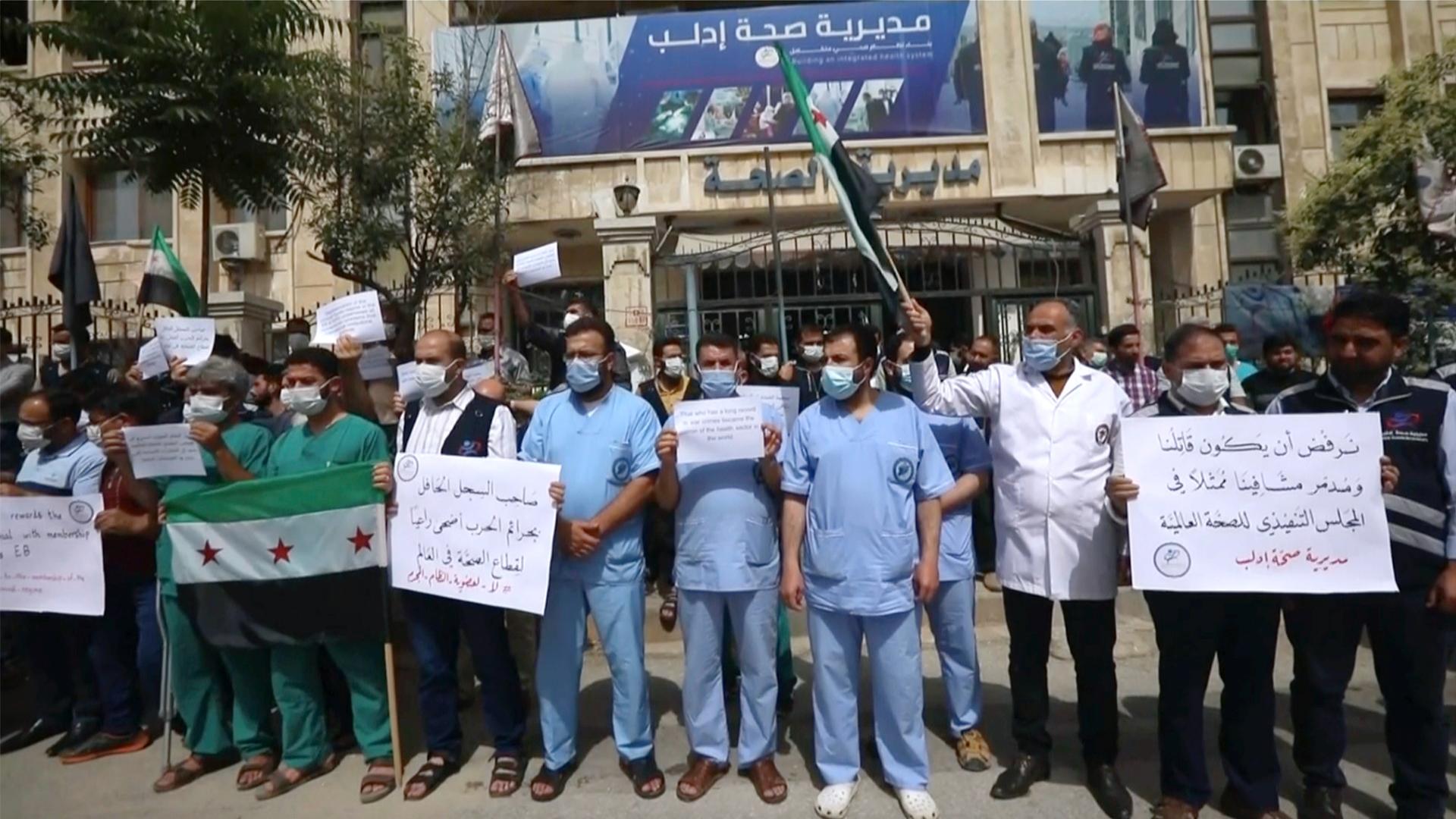Syrians outraged by WHO board election: ‘It’s like appointing a mass murderer to be the police chief’
On Monday, Dr. Salem Abdan participated in a quiet demonstration outside a hospital in the rebel-held city of Idlib, in northwestern Syria.
Adban, head of the health directorate for Idlib — the only part of Syria that remains under opposition control — was there protesting last week’s election of Syria to the World Health Organization’s executive board.
The WHO executive board is made up of 34 representatives designated by member states. They hold three-year terms and set the agenda for the organization and implement its policies.
Related: She survived a chemical attack in Syria. But could her baby have been impacted?
Syria was elected to the executive board by the 22 countries of WHO’s eastern Mediterranean region, the organization said in an email.
For Adban and other Syrians inside and outside the country, news of the appointment was shocking.
“How can we trust WHO (World Health Organization) [of] which one of its executive board members is the murderer who is killing my colleagues, my friends?”
“How can we trust WHO (World Health Organization) [of] which one of its executive board members is the murderer who is killing my colleagues, my friends?” Abdan said in a WhatsApp message.
Abdan said that during the country’s civil war, the Syrian regime has killed hundreds of medical workers and bombed hospitals. Some of these crimes, he said, have been documented by the United Nations itself.
Related: A decade of war has devastated Syria’s health care system
“Hospitals, schools and homes have all been targeted during Syria’s brutal and long-running conflict,” a UN report from last summer said.
Dr. Zaher Sahloul, a Syrian American critical care specialist, was also outraged by the election.
“I thought it was a joke. Like it’s an Onion article,” he said. “Then when I confirmed the news, you know, I felt really sad. It’s like appointing a mass murderer to be the police chief.”
Sahloul lives in Chicago and heads MedGlobal, a nongovernmental organization that supports medical workers in 11 countries, including Syria.
“I worked in hospitals that were built underground in Aleppo and Idlib myself because it was bombed multiple times. I’ve seen the destruction of hospitals by barrel bombs. I’ve worked with doctors who built a hospital in a cave.”
“I worked in hospitals that were built underground in Aleppo and Idlib myself because it was bombed multiple times,” he said. “I’ve seen the destruction of hospitals by barrel bombs. I’ve worked with doctors who built a hospital in a cave.”
Related: Displaced Syrians in Turkey say Syria’s elections are a sham
All that, he said, at the hands of the same government now sitting on the board of the WHO.
Syrians aren’t the only ones upset by WHO’s move. Some top-level diplomats, including Germany’s health minister, Jens Spahn, voiced discontent.
Amy Norris, a senior health adviser to the US State Department, said there are “grave concerns that governments of two new board members, Belarus and Syria,” do not share the WHO’s values demonstrated by their “respective human rights violations and abuses against” their own citizens.
The recognition from WHO represents a drastic shift from where Syria was just a few years ago.
Governments around the world started to cut ties with the Assad government after it unleashed a violent crackdown against its own people.
Iran, Russia and China all helped Assad stay in power, but overall, his government has been isolated.
Related: This center in Turkey was a refuge for Syrian youth. The pandemic shut it down.
Now, Syrians like Suhail al-Ghazi worry that the world is starting to normalize relations with the Syrian government.
Ghazi is a researcher with the Tahrir Institute for Middle East Policy.
“That would be a slap on the face for the Syrian victims who have lost their loved ones and have lost more than that throughout the last 10 years.”
“That would be a slap on the face for the Syrian victims who have lost their loved ones and have lost more than that throughout the last 10 years,” he said.
Ghazi said Syrian state media has reported that Cyprus, Greece, and Hungary are all planning to reopen embassies in Damascus.
The United Arab Emirates reopened its embassy there two years ago and there is speculation that Saudi Arabia could be next.
The US has not openly resumed diplomatic ties, but last summer, the Trump administration sent a delegation to Syria to meet with officials about American hostages held there.
“It sort of puts it in a position where … it’s here to stay,” Noor Hamadeh, a Syrian American lawyer based in Chicago said about normalizing relations with the Assad government.
“And […] for Syrian survivors of human rights abuses perpetrated by the Syrian regime it means that accountability is that much further away.”
Hamadeh said there are no signs that Assad is going anywhere but accountability should come before normalization. Some former Syrian officials have gone on trial in Germany, and that is a good first step, she said, but she wants to see more action.
“Developing some sort of truth-finding commission will be really important,” she explained.
“Another thing is reparations. And again, that’s going to be very difficult while the regime is still in power, but I think for so many Syrians who have lost properties, who have lost family members, who have lost the ability to work as a result of their injuries from war crimes or torture, reparations would be a really important step moving forward.”
